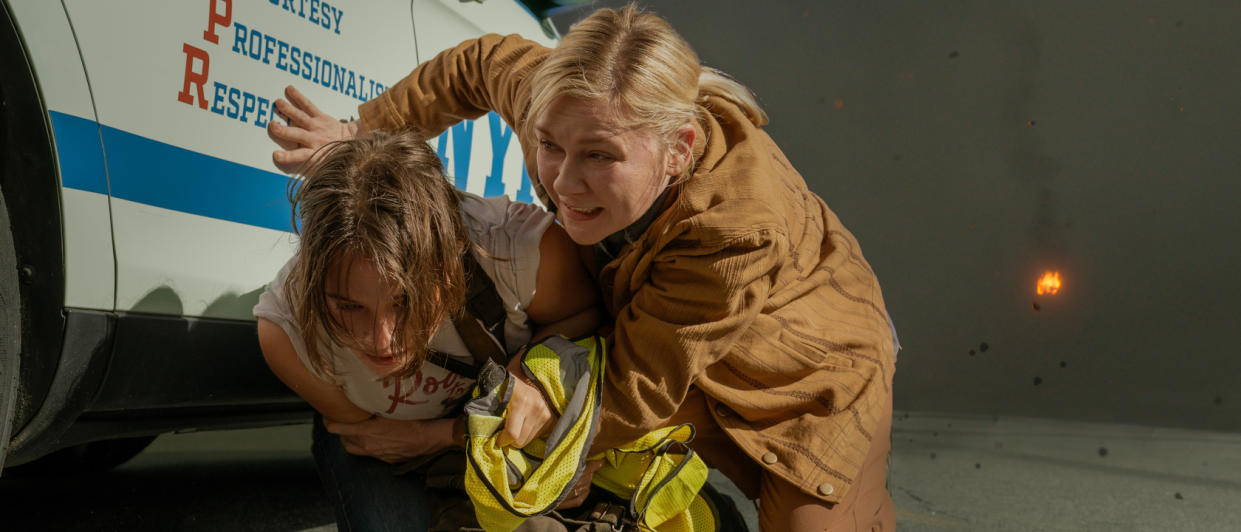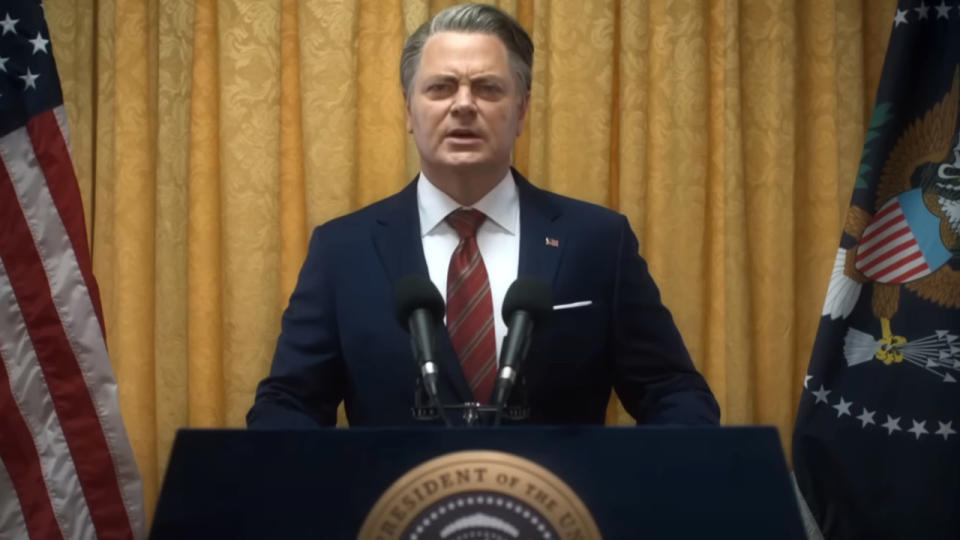Civil War Review: Alex Garland’s Electrifying War Story Is An Intellectual Blockbuster Triumph

Filmmaker Alex Garland is most notably known as a purveyor of sci-fi visions that delve into horrific territory while asking huge questions. That profile of the writer behind films like 28 Days Later, Ex Machina, and Men has only grown over time, with each project seeming to dive deeper into the unknown. For his latest project Civil War, Garland has scaled back the fantastical and focused his storytelling talents on a divided America that’s set in a future that feels uncomfortably close.
Civil War

Release Date: April 12, 2024
Directed By: Alex Garland
Written By: Alex Garland
Starring: Kirsten Dunst, Wagner Moura, Cailee Spaeny, Stephen McKinley Henderson, Sonoya Mizuno and Nick Offerman
Rating: Rated R for strong violent content, bloody/disturbing images, and language throughout
Runtime: 109 minutes
While Garland has eschewed his more genre heavy aesthetic for this grounded drama-thriller, that doesn’t mean that Civil War isn’t as intense as those previous films. As a matter of fact, the realism present in the story of correspondents (Kirsten Dunst, Wagner Moura, Cailee Spaeny, and Stephen McKinley Henderson) traveling across the war torn United States that makes this tale so urgent and horrifying.
Focusing on an American civil war in the aftermath of a third term president’s abuse of power (Nick Offerman), Alex Garland gives his audience two acts of strong character building that takes place through what is constructed as an episodic plot. Throughout those comparatively calmer moments, Garland’s skills are preparing the audience for the final wind up, which includes a third act so electrifying that it embodies shock and awe. The resulting combination is an intellectual blockbuster triumph that continues to prove why the writer/director is one of the most compelling storytellers in the contemporary cinematic landscape.
Alex Garland’s Civil War is his most grounded film, but it also covers some ground very familiar to the filmmaker.
For a movie with the title Civil War, you’d imagine a wide spanning cast bringing to life a larger-than-life conflict. That’s not the mode that Alex Garland chose, however and that decision is firmly in line with his credentials as a thought provoking creative. A strength of Garland’s projects has always been telling as big a story as possible with a tight knit cast of characters, keeping the stakes grounded even in totally alien environments.
That tendency only causes Civil War to dazzle its audience all the more, especially with a performer like Kirsten Dunst anchoring the story as its functional lead. As Dunst's Lee finds herself teamed up with Wagner Moura, Cailee Spaeny, and Stephen McKinley Henderson playing fellow journalists, the actor's stellar work challenges her immediate co-stars and their respective acting games – but it's a win-win scenario that brings out the best in the whole cast, while highlighting that Dunst is one of the finest actors of our time.
Having that strong of a cast anchoring Civil War’s march into Hell gooses the nervous energy to a pleasing degree throughout Rob Hardy’s richly photographic cinematography. Random moments of chaotic action and tension are displayed merely through shutter clicks and the still images they produce. With the film operating with an A-list cast, those expressive moments can be even more harrowing than watching them in real-time.
Perhaps the greatest compliment to Civil War’s strong casting game is the fact that the supporting roles are also made all the better because of it. Alex Garland certainly knows how to assemble a cast, as seen with the inclusion of Nick Offerman and Jesse Plemmons into the mix for smaller parts. Their participation is never distracting or out of step with what the movie is aiming to accomplish, and especially in Plemmons’ case, it leads to one of the most nerve-wracking moments within this story.
Civil War is a thinking person’s blockbuster that is an urgent must in our modern, fractured world.
Alex Garland’s Civil War has been talked up as an apolitical story, and seeing the film, it’s easy to agree with that assessment. By clearly delineating the actions of the antagonists, rather than merely assigning them an “evil” party affiliation, the main conflict is one of moral, not political, issues. There is such meticulous work put into Alex Garland’s story that it’s applicable to anyone who truly believes in law, order, and a free press.
I’ll reinforce my opinion of Civil War being an intellectual blockbuster further here, because some may feel that Christopher Nolan’s Oppenheimer falls into that same bucket. I disagree, as while Nolan’s movie financially performed like a blockbuster, the scale and storytelling were of a more traditional biopic pedigree. Alex Garland, on the other hand, put together a lighting quick ride that is scaled like a blockbuster, but still has an impressive and thought provoking story as its spine.
As the first two acts of Civil War depict humanity’s best and worst impulses with great personal stakes, the final act is a sustained adrenaline rush that doesn’t betray the intimate nature of previous events. If you weren’t sold on the importance of seeing this movie in the IMAX format, the final stretch alone is worth the ticket, thanks to a combat heavy finale that stands shoulder to shoulder with the final moments of Zero Dark Thirty.
There’s been quite a bit of talk about Alex Garland potentially leaving the world of directing after Civil War, as he seems to want to focus more on his writing. I certainly hope the man will keep moving forward with both his directing and writing work, but if he were to seriously step back after this picture’s release, I could totally understand. While Civil War seems to have invigorated his sensibilities on both sides, this would be a hell of a final statement to leave fans with. In Alex Garland I trust.
